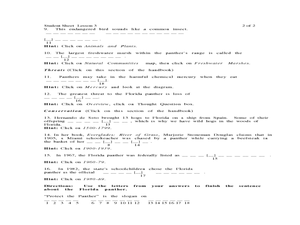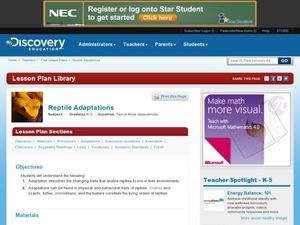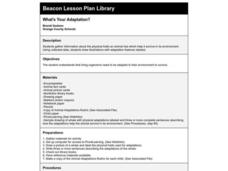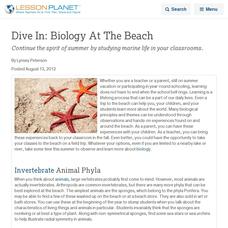Curated OER
Panther Scavenger Hunt
Students research a website to learn about the Florida panther. In this animal research lesson, students use the scavenger hunt directions to search a website about Florida panthers. Students also solve word puzzles within the activity.
Curated OER
Reptile Adaptations
Students research animal adaptations. In this adaptations lesson, students research the physical and behavioral adaptations of animals. Students create a diagram of their animal labeling it's adaptations.
Curated OER
Owen and Mzee
Students examine the trait of compassion. In this character education lesson, students read Owen and Mzee: The True Story of a Remarkable Friendship by Isabella Hatkoff. Students discuss the theme of the story as well as what it means to...
Curated OER
The Sharp Adaptations of Porcupines
In this porcupine worksheet, students learn about how porcupines adapt to their lives in the woods and how they use their quills. After reading a short text and analyzing the labeled pictures, students answer 3 short answer questions.
Curated OER
What's Your Adaptation?
Second graders gather information about the physical traits an animal has which help it survive in its environment. Using collected data, 2nd graders draw illustrations with adaptation features labeled.
Curated OER
Animal Games
Students explore a variety of games on the Internet that will teach them about animals; they focus on the Florida panther. Students choose the activity that is of interest to them, and then rotate between the games online and the games...
It's About Time
Adaptations
Congratulations! You exist, thanks to the wonders of biology and adaptations. The focus of the lesson explains many adaptations of plants and animals and how the environment has influenced the process. A hands-on activity demonstrates...
Chicago Botanic Garden
Migration, Adaptation, and Changing Climates
It is easy for humans to adapt to changing environments, but how do animals and plants do it? Classes discuss how plants and animals deal with environmental changes in the second of seven lessons. Through questions and discussions,...
University of Southern California
What Lives In The Ocean?
One of the most diverse environments on Earth is the ocean. Young scientists explore the living things found in the ocean during an exciting seven-lesson unit. Their study includes organisms from plankton to invertebrates and vertebrates...
American Museum of Natural History
What's This? Reproduction
Attracting the right mate is as important for humans as any other species. An interesting lesson teaches individuals about several strategies that animals and plants have adapted to attract their mates. From colorful nests to powerful...
Curated OER
Blue Planet: Frozen Seas
Learners study the animals from the Arctic and how they have adapted. In this ocean lesson students create a poster about their given animal and present it to the class.
Curated OER
Critters in Your Own Backyard
Students identify various animals and their habitats, as well as their specific traits In this animal habitat lesson, students list animals they've seen in their backyard. Students select one animal and do research. Students then answer...
Curated OER
Critters of the Water
Students examine different organisms in various marine habitats. They identify any adaptations that have allowed the organisms to survive. They develop an imaginary organism and describe its life cycle.
Curated OER
The Perfect Cow?
High schoolers examine how cattle have evolved through natural selection and selective breeding. In this natural selection lesson students compare and contrast natural and artificial selection.
Curated OER
Dive In: Biology At The Beach
Continue the spirit of summer by studying marine life in your classrooms.
Curated OER
Blending Butterflies
Students create camouflage butterflies. In this camouflage lesson plan, students read about the different types of camouflage. Each student in the class chooses a spot in the classroom and creates a camouflaged butterfly. They hang up...
Curated OER
Mammal Morphology - Bats, People, and Other
In this physical characteristics learning exercise, students compare bats and humans by putting a + sign in the chart for whether or not bats and humans have the same characteristics. Students do this for 17 characteristics and answer 3...
Curated OER
Natural Selection And Evolution
Seventh graders investigate the concept of natural selection and its relationship to the theory of evolution. They conduct research using a variety of resources and use the information to create a class presentation and open up the...
Curated OER
Mammal Morphology: bats and people
In this mammals activity, students compare and contrast the physical characteristics of bats and people by filling out a chart. Students complete 17 rows in the chart and answer 3 short answer questions.
Curated OER
Sorting
Students identify how objects can be sorted or classified for easy access. In this sorting activity, students will investigate how letters, numbers, and symbols are used in sorting and classifying.
Curated OER
Become an Expert
Students practice their researching techniques by preparing a presentation with little notice. In this information research lesson, students utilize the Internet to research one of several subtopics concerning panthers. Students...
Curated OER
Show Some Backbone and Teach Invertebrates
Fifth graders identify two similarities and two differences between two phyla, assign fictitious invertebrate to its phylum and explain why it belongs in that grouping, and construct member of given phylum and explain why it should be...
Better Lesson
Better Lesson: Would Your Animal Survive Here? Day 1
Determine whether an animal can survive in a different environment than its own based on its inherited traits.
Alabama Learning Exchange
Alex: Surviving in the World!
After learning about the survival traits of the chameleon, students will work in groups to research the survival traits of other animals on the Internet and will create a slide show using the collected information to share with the...

























